牛津译林版六年级英语下学期Unit 3-4复习资料
小学英语六年级下学期(牛津译林版)Unit 3-4复习资料
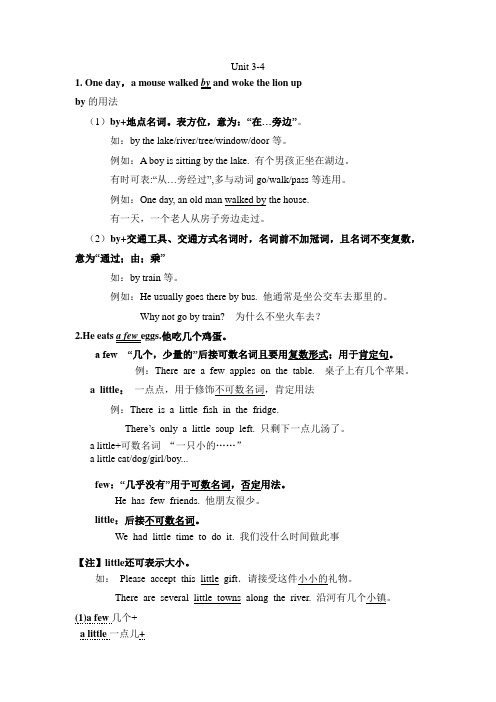
Unit 3-41. One day,a mouse walked by and woke the lion upby的用法(1)by+地点名词。
表方位,意为:“在…旁边”。
如:by the lake/river/tree/window/door等。
例如:A boy is sitting by the lake. 有个男孩正坐在湖边。
有时可表:“从…旁经过”,多与动词go/walk/pass等连用。
例如:One day, an old man walked by the house.有一天,一个老人从房子旁边走过。
(2)by+交通工具、交通方式名词时,名词前不加冠词,且名词不变复数,意为“通过;由;乘”如:by train等。
例如:He usually goes there by bus. 他通常是坐公交车去那里的。
Why not go by train? 为什么不坐火车去?2.He eats a few eggs.他吃几个鸡蛋。
a few “几个,少量的”后接可数名词且要用复数形式;用于肯定句。
例:There are a few apples on the table. 桌子上有几个苹果。
a little:一点点,用于修饰不可数名词,肯定用法例:There is a little fish in the fridge.There’s only a little soup left. 只剩下一点儿汤了。
a little+可数名词“一只小的……”a little cat/dog/girl/boy...few:“几乎没有”用于可数名词,否定用法。
He has few friends. 他朋友很少。
little:后接不可数名词。
We had little time to do it. 我们没什么时间做此事【注】little还可表示大小。
如:Please accept this little gift.请接受这件小小的礼物。
译林版(三起)六年级下册英语Unit3-4知识点归纳
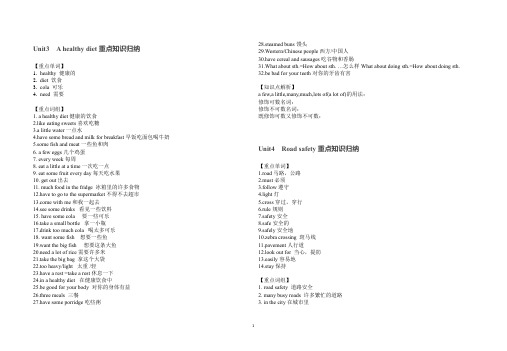
Unit3 A healthy diet重点知识归纳【重点单词】1.healthy 健康的2.diet 饮食3.cola 可乐4.need 需要【重点词组】1.a healthy diet健康的饮食2.like eating sweets喜欢吃糖3.a little water一点水4.have some bread and milk for breakfast早饭吃面包喝牛奶5.some fish and meat一些鱼和肉6.a few eggs几个鸡蛋7.every week每周8.eat a little at a time一次吃一点9. eat some fruit every day每天吃水果10. get out出去11.much food in the fridge冰箱里的许多食物12.have to go to the supermarket不得不去超市e with me和我一起去14.see some drinks看见一些饮料15.have some cola要一些可乐16.take a small bottle拿一小瓶17.drink too much cola喝太多可乐18.want some fish想要一些鱼19.want the big fish想要这条大鱼20.need a lot of rice需要许多米21.take the big bag拿这个大袋22.too heavy/light太重/轻23.have a rest=take a rest休息一下24.in a healthy diet在健康饮食中25.be good for your body对你的身体有益26.three meals 三餐27.have some porridge吃些粥28.steamed buns馒头29.Western/Chinese people西方/中国人30.have cereal and sausages吃谷物和香肠31.What about sth.=How about sth.…怎么样What about doing sth.=How about doing sth.32.be bad for your teeth对你的牙齿有害【知识点解析】a few,a little,many,much,lots of(a lot of)的用法:修饰可数名词:修饰不可数名词:既修饰可数又修饰不可数:Unit4Road safety重点知识归纳【重点单词】1.road马路,公路2.must必须3.follow遵守4.light灯5.cross穿过,穿行6.rule规则7.safety安全8.safe安全的9.safely安全地10.zebra crossing 斑马线11.pavement人行道12.look out for 当心,提防13.easily容易地14.stay保持【重点词组】1. road safety 道路安全2. many busy roads 许多繁忙的道路3. in the city在城市里4. cross the road safely 安全地过马路5. look at the traffic lights 看交通灯6. wait for the green man 等待绿灯7. keep safe 保持安全8. wait on the pavement 在人行道上等待9. look out for cars and bikes 小心小汽车和自行车10. look left/right 看左边/右边11. cross the road with other people 和其他人一起过马路12. see you easily 很容易看见你13.some children 一些孩子们14. a child 一个孩子15. play on the road 在路上玩16. follow the rules 遵守规则17. stay safe on the road 在路上保持安全18. must look for a zebra crossing 必须寻找一条斑马线19. wait at the bus station 在公交车站等20. wait for me 等我21. the other people 其他人22. mustn’t run quickly 绝不能快速地跑步,禁止跑得太快23. the left side of the road 马路的左边24. drive on the right side of the road 马路的右边驾驶25. except me 除了我26. go to see their aunt去看望他们的阿姨27. take the bus 乘车28. get on the bus 上车29. get off the bus 下车30. go on 继续,继续前进31. you’re sick 你生病了32. classroom rules 班级规则33. play ball games 玩球类游戏34. talk loudly 大声地谈论35. listen to your teachers carefully 仔细听老师上课【知识点解析】1.三个含有look的短语意思各不相同:look for寻找look at 看look out for小心,留神I am looking for my keys. 我在找我的钥匙。
2020年牛津译林版六年级英语下册全册复习资料
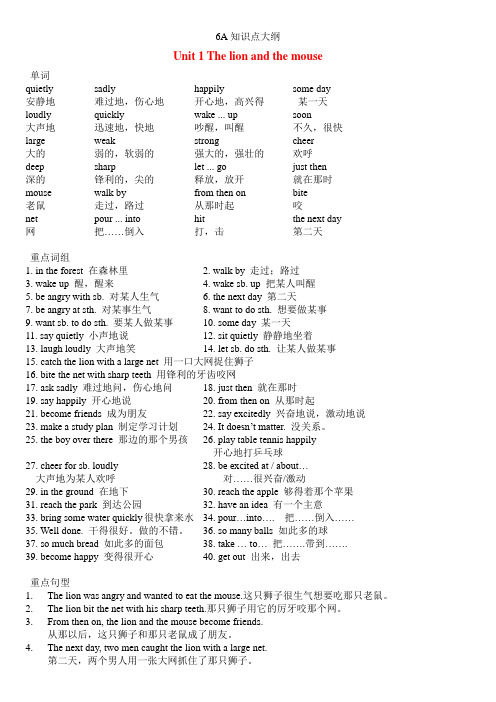
6A知识点大纲Unit 1 The lion and the mouse 单词quietly 安静地sadly难过地,伤心地happily开心地,高兴得some day某一天loudly 大声地quickly迅速地,快地wake ... up吵醒,叫醒soon不久,很快large 大的weak弱的,软弱的strong强大的,强壮的cheer欢呼deep 深的sharp锋利的,尖的let ... go释放,放开just then就在那时mouse 老鼠walk by走过,路过from then on从那时起bite咬net 网pour ... into把……倒入hit打,击the next day第二天重点词组1. in the forest 在森林里2. walk by 走过;路过3. wake up 醒,醒来4. wake sb. up 把某人叫醒5. be angry with sb. 对某人生气6. the next day 第二天7. be angry at sth. 对某事生气8. want to do sth. 想要做某事9. want sb. to do sth. 要某人做某事10. some day 某一天11. say quietly 小声地说12. sit quietly 静静地坐着13. laugh loudly 大声地笑14. let sb. do sth. 让某人做某事15. catch the lion with a large net 用一口大网捉住狮子16. bite the net with sharp teeth 用锋利的牙齿咬网17. ask sadly 难过地问,伤心地问18. just then 就在那时19. say happily 开心地说20. from then on 从那时起21. become friends 成为朋友22. say excitedly 兴奋地说,激动地说23. make a study plan 制定学习计划24. It doesn’t matter. 没关系。
译林版(三起)六年级下册英语Unit3单元知识汇总 (共7张PPT)

六年级下册英语知识清单
Unit ealthy 健康的
2.diet 饮食
3.need
需要
4.cola
可乐
重点短语
1.a little water 2.a few eggs 一点水 几个鸡蛋
3.at a time
4.a healthy diet 5.every day 6.every week
2.Do you have a healthy diet?
你有健康的饮食吗?
3.They have some vegetables.
他们吃一些蔬菜。
4.He has a few eggs every week.
他每周吃几个鸡蛋。 5.He only drinks a little water every day. 他每天只喝一点水。 6.You shouldn't drink too much cola. 你不应该喝太多的可乐。
15.some fruit
16.this big fish 17.need a lot of rice
一些水果
这条大鱼 需要许多大米
18.sweet food
甜食
重点句型
1.Yang Ling often has a lot of noodles for breakfast.
杨玲早饭经常吃很多面条。
一次
健康的饮食 每天 每周
7.a lot of sweets
很多糖果
8.in the fridge
9.go home 10.have a rest
在冰箱里
回家 休息一下
11.take a small bottle 拿一小瓶
12.too much cola 太多可乐
牛津译林版英语六年级下册第三单元重点知识
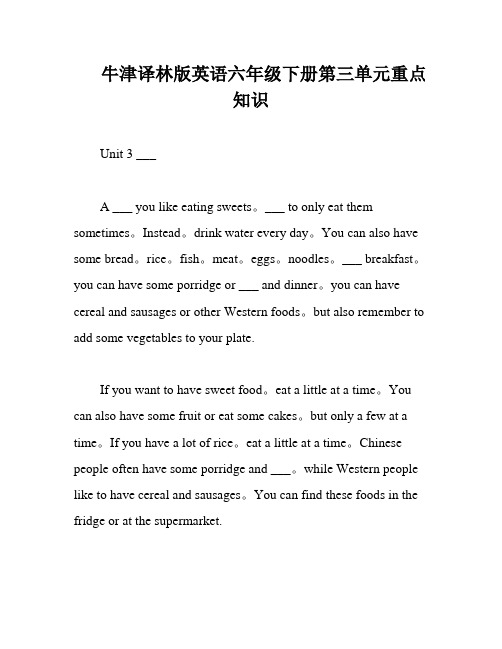
牛津译林版英语六年级下册第三单元重点知识Unit 3 ___A ___ you like eating sweets。
___ to only eat them sometimes。
Instead。
drink water every day。
You can also have some bread。
rice。
fish。
meat。
eggs。
noodles。
___ breakfast。
you can have some porridge or ___ and dinner。
you can have cereal and sausages or other Western foods。
but also remember to add some vegetables to your plate.If you want to have sweet food。
eat a little at a time。
You can also have some fruit or eat some cakes。
but only a few at a time。
If you have a lot of rice。
eat a little at a time。
Chinese people often have some porridge and ___。
while Western people like to have cereal and sausages。
You can find these foods in the fridge or at the supermarket.In the story。
a little mouse lives in her house。
She likes to eat a few things at a time。
like a little cheese or a few crumbs of ___ for her too。
(完整版)新译林英语六年级下册unit3知识点讲解
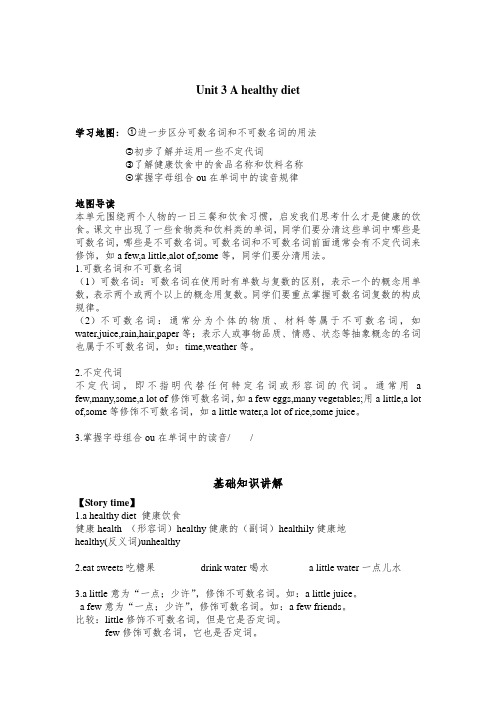
Unit 3 A healthy diet学习地图:①进一步区分可数名词和不可数名词的用法②初步了解并运用一些不定代词③了解健康饮食中的食品名称和饮料名称④掌握字母组合ou在单词中的读音规律地图导读本单元围绕两个人物的一日三餐和饮食习惯,启发我们思考什么才是健康的饮食。
课文中出现了一些食物类和饮料类的单词,同学们要分清这些单词中哪些是可数名词,哪些是不可数名词。
可数名词和不可数名词前面通常会有不定代词来修饰,如a few,a little,alot of,some等,同学们要分清用法。
1.可数名词和不可数名词(1)可数名词:可数名词在使用时有单数与复数的区别,表示一个的概念用单数,表示两个或两个以上的概念用复数。
同学们要重点掌握可数名词复数的构成规律。
(2)不可数名词:通常分为个体的物质、材料等属于不可数名词,如water,juice,rain,hair,paper等;表示人或事物品质、情感、状态等抽象概念的名词也属于不可数名词,如:time,weather等。
2.不定代词不定代词,即不指明代替任何特定名词或形容词的代词。
通常用 a few,many,some,a lot of修饰可数名词,如a few eggs,many vegetables;用a little,a lot of,some等修饰不可数名词,如a little water,a lot of rice,some juice。
3.掌握字母组合ou在单词中的读音/ /基础知识讲解【Story time】1.a healthy diet 健康饮食健康health (形容词)healthy健康的(副词)healthily健康地healthy(反义词)unhealthy2.eat sweets吃糖果drink water喝水 a little water一点儿水3.a little意为“一点;少许”,修饰不可数名词。
如:a little juice。
译林版六年级英语下册全册复习资料
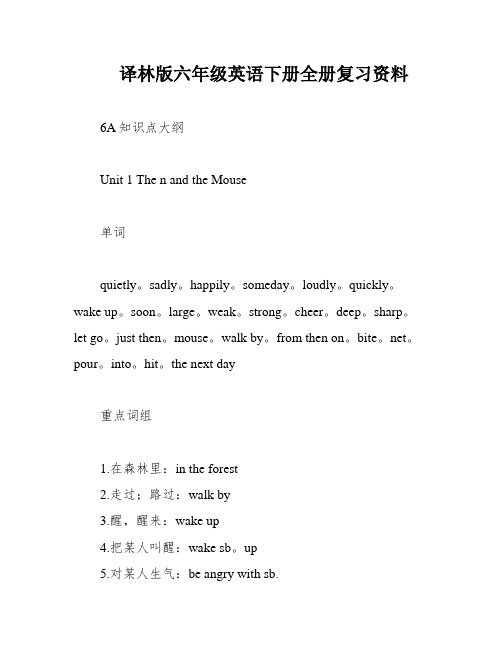
译林版六年级英语下册全册复习资料6A知识点大纲Unit 1 The n and the Mouse单词quietly。
sadly。
happily。
someday。
loudly。
quickly。
wake up。
soon。
large。
weak。
strong。
cheer。
deep。
sharp。
let go。
just then。
mouse。
walk by。
from then on。
bite。
net。
pour。
into。
hit。
the next day重点词组1.在森林里:in the forest2.走过;路过:walk by3.醒,醒来:wake up4.把某人叫醒:wake sb。
up5.对某人生气:be angry with sb.6.第二天:the next day7.对某事生气:be angry at sth.8.想要做某事:want to do sth.9.要某人做某事:want sb。
to do sth.10.某一天:someday11.小声地说:say quietly12.静静地坐着:sit quietly13.大声地笑:laugh loudly14.让某人做某事:let sb。
do sth.15.用一口大网捉住狮子:catch the n with a large net16.用锋利的牙齿咬网:bite the net with sharp teeth17.难过地问,伤心地问:ask sadly18.就在那时:just then19.开心地说:say happily20.从那时起:from then on21.成为朋友:e friends22.兴奋地说,激动地说:say excitedly23.制定研究计划:make a study plan24.没关系:It doesn't matter.25.那边的那个男孩:the boy over there26.开心地打乒乓球:play table tennis happily27.大声为某人加油:cheer for sb。
小学英语六年级下册英语Unit 3~4 重难点语法归纳+典例易错对点练+语法专项习题 译林版(word版,含答案)

Unit 3~Unit 4 语法专项训练重难点语法归纳一、a ot of/ot of, man, much, ome, a few, a itte的用法1只修饰可数名词复数:man, a few2只修饰不可数名词:much, a itte3既修饰可数名词复数又修饰不可数名词:a ot of/ot of, ome练习1:单项选择。
1 —How much ________ do ou want to bu —A itteA tomatoeB riceC aeA a ot ofB a itteC a few You can’t eat ________ meat You houd eat ________ vegetabe o man; ome B too much; ome C too much;a itte4 Chinee e _________ and teamed bun for breafatA cereaB auageC uch; a few B man;a itte C man; a few二、ome和an的用法ome和an都表示“一些”,它们既可以修饰可数名词复数,也可以修饰不可数名词。
它们的区别如下:常用在肯定句中。
常用在否定句和疑问句中。
易错点提醒:1在表示提出建议、邀请或请求等的疑问句中,如果希望对方做出肯定回答,常使用ome而不用an。
2肯定句中表示“任何”时,我们要使用an。
练习2:选择合适的词填空。
1 Woud ou ie _________ ome/an ice cream2 Mie ha ________ ome/an bread and mi for breafat3 She doen’t eat ________ ome/an fruit ever da 【易错题】4 Do ou have _________ ome/an meat for unch5 Can I have ________ ome/an a ut的用法mut表示“必须”,属于情态动词,后面接动词原形。
6B六下译林英语Unit3-4单元复习
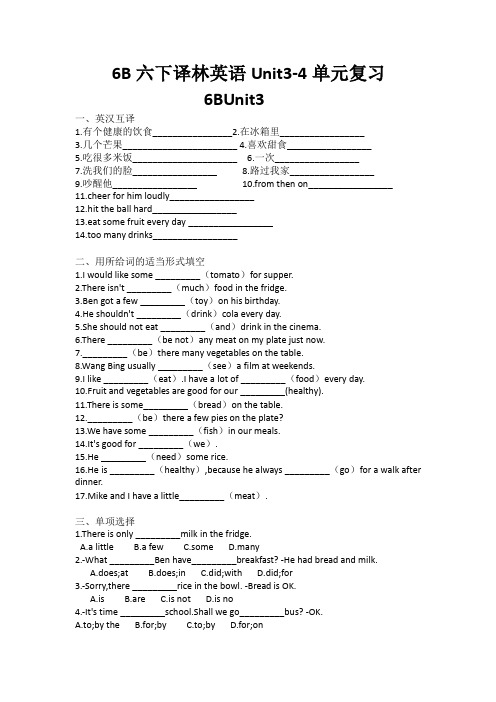
6B六下译林英语Unit3-4单元复习6BUnit3一、英汉互译1.有个健康的饮食________________2.在冰箱里_________________3.几个芒果_______________________4.喜欢甜食_________________5.吃很多米饭_____________________6.一次_________________7.洗我们的脸_________________ 8.路过我家_________________9.吵醒他_________________ 10.from then on_________________11.cheer for him loudly_________________12.hit the ball hard_________________13.eat some fruit every day _________________14.too many drinks_________________二、用所给词的适当形式填空1.I would like some _________(tomato)for supper.2.There isn't _________(much)food in the fridge.3.Ben got a few _________(toy)on his birthday.4.He shouldn't _________(drink)cola every day.5.She should not eat _________(and)drink in the cinema.6.There _________(be not)any meat on my plate just now.7._________(be)there many vegetables on the table.8.Wang Bing usually _________(see)a film at weekends.9.I like _________(eat).I have a lot of _________(food)every day.10.Fruit and vegetables are good for our _________(healthy).11.There is some_________(bread)on the table.12._________(be)there a few pies on the plate?13.We have some _________(fish)in our meals.14.It's good for _________(we).15.He _________(need)some rice.16.He is _________(healthy),because he always _________(go)for a walk after dinner.17.Mike and I have a little_________(meat).三、单项选择1.There is only _________milk in the fridge.A.a littleB.a fewC.someD.many2.-What _________Ben have_________breakfast? -He had bread and milk.A.does;atB.does;inC.did;withD.did;for3.-Sorry,there _________rice in the bowl. -Bread is OK.A.isB.areC.is notD.is no4.-It's time _________school.Shall we go_________bus? -OK.A.to;by theB.for;byC.to;byD.for;on5.-Mum,can I have _________noodles? -Sorry,we don't have _________.A.any;someB.some;someC.some;anyD.any;any6.A healthy diet means you should have _______vegetables and fruit for meals.A.a lot ofB.anyC.a fewD. a little7.I like _________and_________very much.A.noodle;dumplingB.noodles and dumplingsC.noodles;dumplingD.noodle;dumplings8._________there any milk in the glass just now?A.IsB.WasC.AreD.Were9.Sweet food is not good for our_________.A.toothB.toothsC.teethD.toothes10.You shouldn't drink _________cola.A.too manyB.much tooC.too muchD.many too11.I _________go to the supermarket.There is no food in the fridge.A.canB.have toC.needD.should12.-Can I have_________orange juice? -OK.A.anyB.manyC.someD.much14.The child _________eating ice creams.A.areB.likeC.likesD.wants15.My sisters _________like meat.A.aren'tB.doesn'tC.don'tD.isn't16.Do you want_________a glass of water?A.eatB.to eatC.haveD.to drink17.I _________some rice and vegetables today.A.have onlyB.has onlyC.only hasD.only have18.Would you like _________bread? -Yes,please.A.aB.anyC.anD.some19.Here _________a lot of cakes for the party.A.areB.isC.thatD.no20.I have _________beautiful caps in my bedroom.A.a littleB.littleC.a fewD.lot of21.She _________an egg for breakfast this morning.A.eatB.haveC.hadD.eating四、按要求完成句子1.Helen eats some sweets every day.(改为一般疑问句)_________ Helen _________ _________sweets every day?2.Mary has a little meat every day.(对划线部分提问)_________ _________ meat_________ Mary have every day?3.Amy likes oranges.(改为否定句)Amy _________ _________oranges.4.Eating too many sweets is not good for our teeth.(改为同义句)Eating too many sweets is_________for our teeth.5.We should drink a lot of water.(对划线部分提问)_________ should you _________?6.My father eats bread and milk for breakfast.(对划线部分提问)_________ _________ _________father _________for breakfast.7.The classroom is bright.(改为感叹句)_________ _________ the classroom is!8.He would like some fish for lunch.(改为同义句)He _________some fish for lunch.9.Sam has a few pencils in his pencil box.(对划线部分提问)_________ _________ pencils does Sam _________in his pencil box?6BUnit4一、英汉互译1.安全过马路________________2.必须等待________________3.在道路的右边________________4.寻找斑马线________________5.遵守规则________________6.左右看________________7.这么多人________________ 8.开得快________________9.看着红灯________________ 10.stop and wait________________11.see them easily ________________12.look out for________________13.to keep safe________________ 14.wait on the pavement________________二、用所给词的适当形式填空1.Can you _________(drive)on the road?2.You must look at the _________(交通)lights and wait for the green man.3.Look for a zebra_________(cross)before you _________(cross)the road.4.Be _________(careful)!You can see the cars_________(easy)5.The girl can sing the song _________(good).6.He should _________(put)his books in order.7.They _________(have)an English lesson now.8.It is a _________(sun)day.9.Can you _________(drive)on the road?10._________(cross)a busy road safely,we must look for zebra crossing first.11.Do you like_________(read)_________(story)?12.The picture can help you _________(do)it.13._________(遵守)the rules,and stay _________on the road.14.Don't forget_________(look)out for the cars.15.There_________(be)so much juice in the fridge.16.-What is Tom_________(do)?-He's _________(walk)on the road.17.-What does Tom _________(do)? -He is a teacher.18.My mother_________(cross)the road and went into a bookshop.19.Follow _________(he),please.20.I'm late for school.I must run_________(quick).21._________(not)play on the busy road.22.How can you cross _________(they)_________(safe)?23.How _________(do)Tina get to Forest Park?三、单项选择1.Here is the_________man.You ________cross the road now.A.green;mustn'tB.red;canC.red;couldn'tD.red;mustn't2.To keep safe,you can wait_____the pavement and look_______for the cars.A.on;outB.in;outC.on;atD.for ;out3.The bus stopped and Bobby _________:"Why is the bus _________again?"A.ask;stoppingB.asks;stopsC.asked;stoppedD.asked;stopping4.-Would you like to go walking with us?-____,but I must do my homework first.A.Of course notB.That's all rightC.I'd love toD.Yes,I do5.There was _________lion in the forest._________lion was very large.A.a;TheB.the;TheC.the;AD.a;A6.There _________traffic lights here.A.aren'tB.are anyC.are noD.are no any7.I can drive the car_________.A.safetyB.safelyC.safeD.safes8.We can see a lot of cars _________the city.A.atB.OnC.inD.of9.My _________car is over there.It's red.A.oneB.firstC.twoD.three10.We must_________a zebra crossing.A.lookB.look forC.looked forD.found11.The boy _________the right is my brother.A.InB.atC.onD.by12.We mustn't shout _________run in class.A.andB.orC.withD.of13.What must you do _________the road safely.A.crossB.crossingC.to crossD.to crossing14.It's time _________class.A.atB.toC.forD.in15.Look at the green man.It _______we can_______now.A.mean;walkB.mean;stopC.means ;walkD.means;stop16.My father is a good driver.He always _________on the busy road.A.drive slowlyB.drive fastC.drives slowlyD.drives fast四、按要求完成句子1.You must play on the road.(改为否定句)You _________play on theroad.2.We must follow the rules on the road.(改为一般疑问句)_________ _________ _________the rules on the road?3.You must not read on the road.(对划线部分哈提问)_________ _________I _________ _________on the road?4.Some children play football on the road.(改为现在进行时)Some children _________ _________football on the road.5.There are no cars in the street.(改为同义句)There _________ _________cars in the street.6.There are many busy roads in the city.(改成一般疑问句)_________ _________ _________ busy roads in the city?7.You can cross the road with other people.(对划线部分提问)_________ _________ you cross the road?8.WeHe had some bread for breakfast.(对划线部分提问)_________ _________ he _________for breakfast.。
牛津译林版六年级英语下册各单元全册知识点复习整理
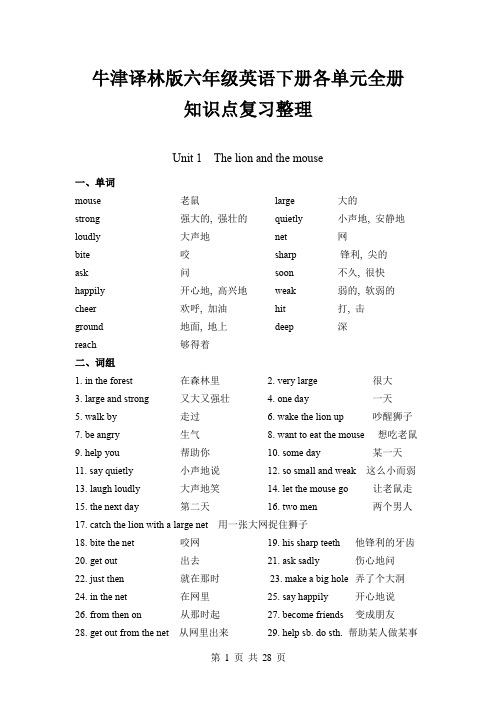
牛津译林版六年级英语下册各单元全册知识点复习整理Unit 1 The lion and the mouse一、单词mouse老鼠large大的strong强大的, 强壮的quietly小声地, 安静地loudly大声地net网bite咬sharp锋利, 尖的ask问soon不久, 很快happily开心地, 高兴地weak弱的, 软弱的cheer欢呼, 加油hit打, 击ground地面, 地上deep深reach够得着二、词组1. in the forest 在森林里2. very large 很大3. large and strong 又大又强壮4. one day 一天5. walk by 走过6. wake the lion up 吵醒狮子7. be angry 生气8. want to eat the mouse想吃老鼠9. help you 帮助你10. some day 某一天11. say quietly 小声地说12. so small and weak 这么小而弱13. laugh loudly 大声地笑14. let the mouse go 让老鼠走15. the next day 第二天16. two men 两个男人17. catch the lion with a large net 用一张大网捉住狮子18. bite the net 咬网19. his sharp teeth 他锋利的牙齿20. get out 出去21. ask sadly 伤心地问22. just then 就在那时23. make a big hole 弄了个大洞24. in the net 在网里25. say happily 开心地说26. from then on 从那时起27. become friends 变成朋友28. get out from the net 从网里出来29. help sb. do sth. 帮助某人做某事30. a happy boy 一个开心/幸福的男孩31. talk excitedly 兴奋地交谈32. the sweet shop 糖果店33. want to buy 想要买34. a lollipop 一个棒棒糖35. Aesop’s Fables 伊索寓言36. find many animal stories找到许多动物故事37. a Chinese idiom book 一本中国成语书38. play table tennis happily 开心地打乒乓39. be good at table tennis 擅长打乒乓40. cheer for them loudly 为他们大声地欢呼41. too excited 太兴奋42. hit the ball hard 用力打球43. find the ball 找到球44. find a hole in the ground 在地上找到一个洞45. in the hole 在洞里46. too deep 太深47. can’t reach it 够不着它48. have an idea 有一个主意49. bring some water quickly很快拿来一些水50. pour it into the hole 把它倒进洞里51. so many balls 这么多球52. go to a shopping centre 去购物中心53. see a small boy 看见一个小男孩54. on the floor 在地板上55. take him to an office 带他去办公室56. give him a sweet 给他一颗糖57. become happy 变得高兴58. like helping people 喜欢帮助人们59. make a study plan 制定一个学习计划60. read quietly 安静地看书61. a weak animal 一个弱小的动物62. a sharp knife 一把锋利的刀63. walk by走过, 路过64. wake . . . up吵醒, 叫醒65. some day 某一天66. the next day第二天67. just then就在那时68. get out出来, 出去69. from then on从那时起70. pour… into把…. . . 倒入三、重点句型1. One day, a mouse walked by and woke the lion up. 一天, 一只老鼠走过, 吵醒了狮子。
译林版(三起)六年级下册英语Unit3单元知识汇总 (共7张PPT)

Unit 3
YL版
重点单词
1.healthy 健康的 3.need 需要
2.diet 饮食 4.cola 可乐
重点短语
1.a littlቤተ መጻሕፍቲ ባይዱ water 一点水
2.a few eggs 几个鸡蛋
3.at a time
一次
4.a healthy diet 健康的饮食
5.every day
•
14、抱最大的希望,作最大的努力。2 021年5 月11日 星期二 上午8 时31分5 秒08:3 1:0521. 5.11
•
15、一个人炫耀什么,说明他内心缺 少什么 。。202 1年5月 上午8 时31分2 1.5.110 8:31M ay 11, 2021
•
16、业余生活要有意义,不要越轨。2 021年5 月11日 星期二 8时31 分5秒08 :31:051 1 May 2021
•
17、一个人即使已登上顶峰,也仍要 自强不 息。上 午8时31 分5秒 上午8时 31分08 :31:052 1.5.11
14.go to the supermarket 去超市
15.some fruit
一些水果
16.this big fish
这条大鱼
17.need a lot of rice 需要许多大米
18.sweet food
甜食
重点句型
1.Yang Ling often has a lot of noodles for breakfast. 杨玲早饭经常吃很多面条。
•
11、人总是珍惜为得到。21.5.1108:31: 0508:3 1May-2 111-Ma y-21
六年级下册英语知识素材 Unit 3-Unit 4单元复习及拓展练习 译林版(三起)(无答案)
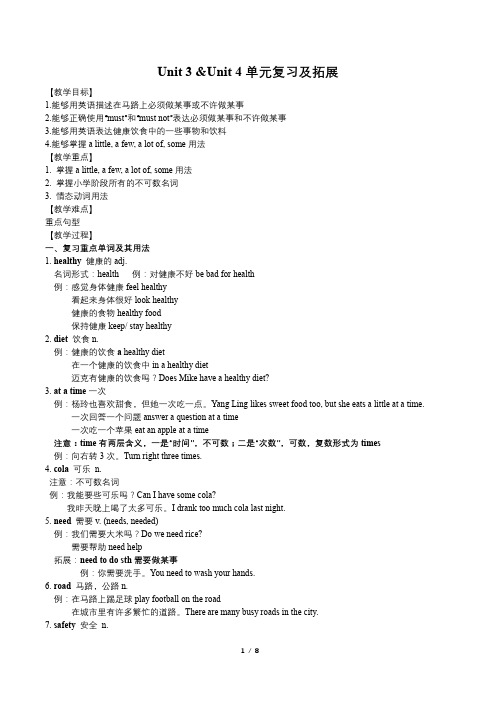
Unit 3 &Unit 4单元复习及拓展【教学目标】1.能够用英语描述在马路上必须做某事或不许做某事2.能够正确使用“must”和“must not”表达必须做某事和不许做某事3.能够用英语表达健康饮食中的一些事物和饮料4.能够掌握a little, a few, a lot of, some用法【教学重点】1. 掌握a little, a few, a lot of, some用法2. 掌握小学阶段所有的不可数名词3. 情态动词用法【教学难点】重点句型【教学过程】一、复习重点单词及其用法1. healthy健康的adj.名词形式:health 例:对健康不好be bad for health例:感觉身体健康feel healthy看起来身体很好look healthy健康的食物healthy food保持健康keep/ stay healthy2. diet饮食n.例:健康的饮食a healthy diet在一个健康的饮食中in a healthy diet迈克有健康的饮食吗?Does Mike have a healthy diet?3. at a time一次例:杨玲也喜欢甜食,但她一次吃一点。
Yang Ling likes sweet food too, but she eats a little at a time.一次回答一个问题answer a question at a time一次吃一个苹果eat an apple at a time注意:time有两层含义,一是“时间”,不可数;二是“次数”,可数,复数形式为times例:向右转3次。
Turn right three times.4. cola可乐n.注意:不可数名词例:我能要些可乐吗?Can I have some cola?我昨天晚上喝了太多可乐。
I drank too much cola last night.5. need需要v. (needs, needed)例:我们需要大米吗?Do we need rice?需要帮助need help拓展:need to do sth需要做某事例:你需要洗手。
译林版六年级下Unit3知识点梳理
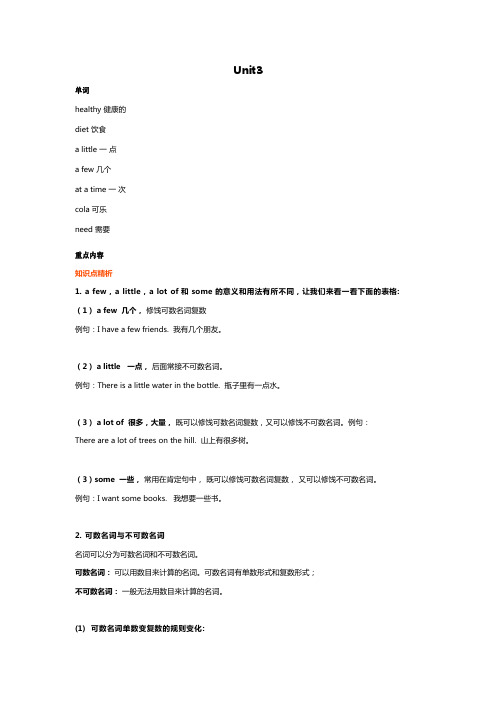
Unit3单词healthy 健康的diet 饮食a little 一点a few 几个at a time 一次cola 可乐need 需要重点内容知识点精析1.a few, a little, a lot of 和 some 的意义和用法有所不同,让我们来看一看下面的表格:(1) a few 几个,修饯可数名词复数例句:I have a few friends. 我有几个朋友。
(2) a little 一点,后面常接不可数名词。
例句:There is a little water in the bottle. 瓶子里有一点水。
(3) a lot of 很多,大量,既可以修饯可数名词复数,又可以修饯不可数名词。
例句:There are a lot of trees on the hill. 山上有很多树。
(3)some 一些,常用在肯定句中,既可以修饯可数名词复数,又可以修饯不可数名词。
例句:I want some books. 我想要一些书。
2.可数名词与不可数名词名词可以分为可数名词和不可数名词。
可数名词:可以用数目来计算的名词。
可数名词有单数形式和复数形式;不可数名词:一般无法用数目来计算的名词。
(1)可数名词单数变复数的规则变化:① 一般情况下在词尾加sdesk desks 书桌map maps 地图penpens 钢笔girlgirls 女孩② 以 s,x,ch,sh 结尾的词在词尾加esclass classes 班级boxboxes 盒子peachpeaches 桃子③ 以辅音字母加 y 结尾的词先变 y 为 i,再加esfactory factories 工厂baby babies 婴儿familyfamilies 家庭city cities 城市④ 以元音字母加 y 结尾的词在词尾加sdaydays 天boyboys 男孩keykeys 钥匙⑤ 以 f 戒 fe 结尾的词变 f 戒 fe 为 v, 再加 esknife knives 刀wifewives 妻子leafleaves 叶子life lives生命⑥ 以辅音字母加 o 结尾且表示有生命的事物的词,一般在词尾加es potato potatoes 土豆tomato tomatoes 西红柿hero heroes 英雄⑦ 以元音字母加 o 结尾且表示无生命的事物的词, 一般在词尾加s radioradios 收音机zoozoos 动物园(2)有些名词复数形式的变化是不规则的。
六下英语各单元知识点译林版
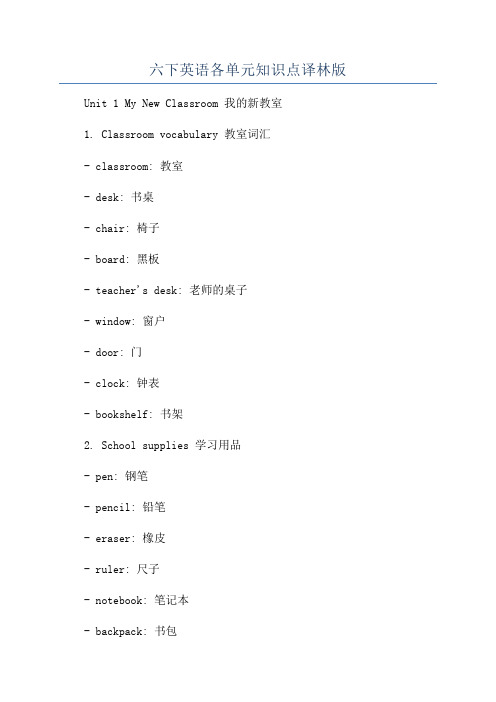
六下英语各单元知识点译林版Unit 1 My New Classroom 我的新教室1. Classroom vocabulary 教室词汇- classroom: 教室- desk: 书桌- chair: 椅子- board: 黑板- teacher's desk: 老师的桌子- window: 窗户- door: 门- clock: 钟表- bookshelf: 书架2. School supplies 学习用品- pen: 钢笔- pencil: 铅笔- eraser: 橡皮- ruler: 尺子- notebook: 笔记本- backpack: 书包- glue: 胶水- scissors: 剪刀- crayon: 蜡笔- marker: 马克笔3. Sentences 句子- This is my new classroom. 这是我的新教室。
- There is a blackboard on the wall. 墙上有一个黑板。
- I sit at the desk. 我坐在桌子旁边。
- The teacher stands in front of the classroom. 老师站在教室前面。
Unit 2 I'm a Student 我是学生1. School subjects 学科- Chinese: 语文- English: 英语- math: 数学- science: 科学- history: 历史- geography: 地理- art: 美术- music: 音乐- physical education: 体育2. Daily schedules 日程安排- I have Chinese class in the morning. 早上我有语文课。
- We have math class in the afternoon. 下午我们有数学课。
- We have art class on Wednesday. 我们星期三有美术课。
译林版六年级下册英语Unit3-4试题
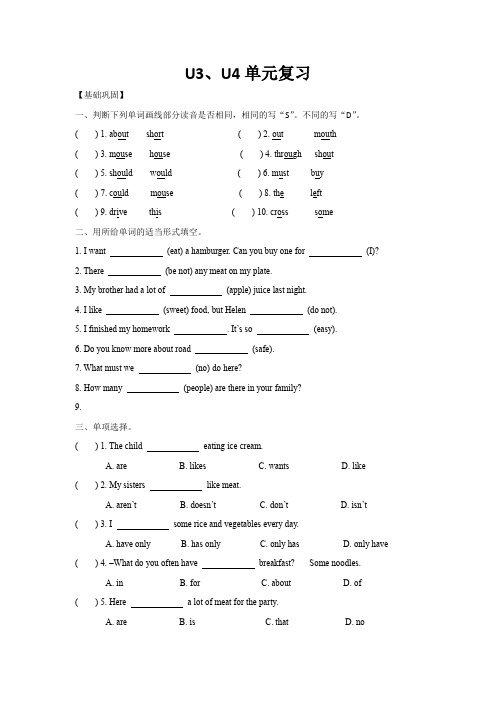
U3、U4单元复习【基础巩固】一、判断下列单词画线部分读音是否相同,相同的写“S”。
不同的写“D”。
( ) 1. about short ( ) 2. out mouth( ) 3. mouse house ( ) 4. through shout( ) 5. should would ( ) 6. must buy( ) 7. could mouse ( ) 8. the left( ) 9. drive this ( ) 10. cross some二、用所给单词的适当形式填空。
1. I want (eat) a hamburger. Can you buy one for (I)?2. There (be not) any meat on my plate.3. My brother had a lot of (apple) juice last night.4. I like (sweet) food, but Helen (do not).5. I finished my homework . It’s so (easy).6. Do you know more about road (safe).7. What must we (no) do here?8. How many (people) are there in your family?9.三、单项选择。
( ) 1. The child eating ice cream.A. areB. likesC. wantsD. like ( ) 2. My sisters like meat.A. aren’tB. doesn’tC. don’tD. isn’t ( ) 3. I some rice and vegetables every day.A. have onlyB. has onlyC. only hasD. only have ( ) 4. –What do you often have breakfast? --Some noodles.A. inB. forC. aboutD. of ( ) 5. Here a lot of meat for the party.A. areB. isC. thatD. no( ) 6. I can drive the car .A. safetyB. safelyC. safeD. safes( ) 7. My car is over there. It’s red.A. oneB. firstC. twoD. three( ) 8. –Will you go to the supermarket?--Yes, please me.A. waitB. wait ofC. wait forD. waits( ) 9. The boy the right is my brother.A. inB. onC. atD. by( ) 10. We mustn’t shout run in class.A. andB. orC. withD. of( ) 11. a healthy diet, there is rice and bread.A. OnB. InC. AtD. Of( ) 12. There any fruit or vegetables on the table.A. isB. isn’tC. areD. aren’t ( ) 13. Milk is good you. Please drink more milk.A. atB. ofC. forD. in( ) 14. They in the kitchen.A. also areB. are alsoC. also aren’tD. also( ) 15. I don’t like meat fish.A. andB. orC. ofD. but( ) 16. –How can you go to the zoo? --I can a bus.A. byB. getC. takeD. takes ( ) 17. –Are you thirteen or fourteen?--.A. Yes.B. No.C. No, I’m thirteen.D. I’m thirteen. ( ) 18. Each student some storybooks.A. haveB. hasC. havingD. haves四、根据实际情况回答问题。
译林版六年级下册1-4 单元知识点

六年级知识点Unit 1 The lion and the mouse一、四会单词 rge大的 2. strong强壮的 3. quietly安静地;小声地4. Weak虚弱的5. loudly大声地6. happily开心地;高兴地二、三会单词老鼠mouse 复数mice 走过,路过walk by 吵醒,叫醒,弄醒,醒醒wake up某一天some day 释放不能,放开 let go 第二天the next day 网net咬 bite 锋利的,尖的 sharp 难过地,伤心地sadly 就在那时just then 不久,很快soon 从那时起from then on 欢呼cheer 打,击hit深的deep 够得着reach 迅速地,快地quickly 把….倒入pour….into 三、短语积累狮子和老虎 the lion and the mouse mouse: 复数 mice 辨析 mouth嘴巴 month月份又大又强壮 large and strong又小又弱 small and weak走过… walk by 走过森林 walk by the forest把狮子叫醒 wake the lion up (代词宾格放中间) wake me up我能在某一天帮助你 I can help you some day将来不确定的某一天 Some day:安静地说 say quietly quiet→quietly大声地笑道 laugh loudly loud→loudly让狮子走 let the mouse go let sb do第二天the next day用一个大网抓住狮子catch the lion with a large net catch过去式:caught用他的锋利的牙齿咬网 bite the net with his sharp teeth (tooth) bite过去式: bit出来 get out伤心地问道 ask sadly sad→sadly就在那个时候 just then在网里弄了个大洞 make a big hole in the net开心地说say happily happy→happily从那时起 from then on成为好朋友 become good friends become +形容词变得如何…糖果店 sweet shop 一个棒棒糖a lollipop他会说什么? what will he say?没关系 It doesn’t matter.伊索寓言 Aesop’s Fables 一本中文成语书 a Chinese idiom book开心地打乒乓 play table tennis happily擅长 be good at+名词 // be good at +动词ing大声地为他们欢呼 cheer for them loudly cheer for为…欢呼击球用力hit the ball hard hit打,击 (过去式: hit):最后finally 近意: at last太深too deep我够不到 I can’t reach it reach到达 reach my school迅速地拿一些水来 bring some water quickly把它倒进洞里pour it in the hole干得好! Well done!四、四会句子The mouse said quietly. 老鼠小声地说。
- 1、下载文档前请自行甄别文档内容的完整性,平台不提供额外的编辑、内容补充、找答案等附加服务。
- 2、"仅部分预览"的文档,不可在线预览部分如存在完整性等问题,可反馈申请退款(可完整预览的文档不适用该条件!)。
- 3、如文档侵犯您的权益,请联系客服反馈,我们会尽快为您处理(人工客服工作时间:9:00-18:30)。
Unit 3-41. One day,a mouse walked by and woke the lion upby的用法(1)by+地点名词。
表方位,意为:“在…旁边”。
如:by the lake/river/tree/window/door等。
例如:A boy is sitting by the lake. 有个男孩正坐在湖边。
有时可表:“从…旁经过”,多与动词go/walk/pass等连用。
例如:One day, an old man walked by the house.有一天,一个老人从房子旁边走过。
(2)by+交通工具、交通方式名词时,名词前不加冠词,且名词不变复数,意为“通过;由;乘”如:by train等。
例如:He usually goes there by bus. 他通常是坐公交车去那里的。
Why not go by train? 为什么不坐火车去?2.He eats a few eggs.他吃几个鸡蛋。
a few “几个,少量的”后接可数名词且要用复数形式;用于肯定句。
例:There are a few apples on the table. 桌子上有几个苹果。
a little:一点点,用于修饰不可数名词,肯定用法例:There is a little fish in the fridge.There’s only a little soup left. 只剩下一点儿汤了。
a little+可数名词“一只小的……”a little cat/dog/girl/boy...few:“几乎没有”用于可数名词,否定用法。
He has few friends. 他朋友很少。
little:后接不可数名词。
We had little time to do it. 我们没什么时间做此事【注】little还可表示大小。
如:Please accept this little gift.请接受这件小小的礼物。
There are several little towns along the river. 沿河有几个小镇。
(1)a few几个+__________a little一点儿+__________A lot of 许多,既可加__________,又可加__________。
Some/any一些既可加__________,又可加__________。
(2) much修饰__________,意思是“__________”通常用于__________句中many与__________形式连用。
例如:too__________cola(3) Mum, do we need any rice? need意思是“__________”(4) YangLing likes sweet food too, but she eats a little at a a time. at a time 是“__________”的意思。
3.He usually finishes his homework before dinner.one’s的用法:词组有:brush one’s teeth 刷牙do one’s homework 做回家作业one’s代表“某人的”,在句子中要用物主代词来替换它,一般情况下是与主语相呼应。
如:We should brush our teeth every morning. 我们应该每天早上刷牙。
She often does her homework before dinner. 她经常晚饭前做作业。
4. turn(1)n.轮流、依次轮流的顺序E.g .Now it’s your turn to read the text. 现在轮到你读课文了。
It's my turn to use the bike. 该轮到我用自行车了。
(2) v.转变,变成【短语】turn into变成E.g .Water turns into ice. 水变成了冰。
turn ... into ... (使……)成为……E.g. The farmers are turning waste land into rice fields. 农民们把荒地变成了稻田。
5. point v. 指【短语】point at指着;point to指向;point out指出E.g. A l ittle boy pointed at the king and laughed…一个小男孩指着国王并大笑着……The boy pointed at the book and said,“it’s mine.”那个男孩指着那本书说:“它是我的书。
”【辨析】point at & point topoint at习惯上表示指向离说话人较近的事物,意为“指着”,at是介词,着重于指的对象,指人时一般表示粗鲁或不礼貌。
例如:The teacher pointed at the blackboa rd and said,“you must look carefully.”point to多用来表示指向离说话人较远的事物,意为“指向”,to 是介词,强调方向,并不是指着该物体。
例如:He pointed to the house on the other side of the river and said,“that’s my home.”他指向河对岸的房子说:“那是我的家。
”6.we need a lot of rice 我们需要许多米。
一、need:用作情态动词后接动词原形,是“需要,必要”的意思。
没有人称和数的变化。
不论主语是第几人称,不论主语是单数还是复数,情态都词都无形式变化,1.肯定句:主语+need + do +其他。
2.否定式:主语+needn’t+ do +其他。
You needn’t clean the house now. 你不必现在打扫房子。
3.疑问句Need +主语+ do+其他…?need引导的疑问句,肯定回答要用must。
—Need I call him up now? 我需要现在给他打电话吗? ——Yes, you must. 是的,需要打。
—No, you needn’t. 不,不需要现在打。
二、用作实义动词作为实义动词,need后面的宾语可以是名词、动名词、动词不定式或代词,这种情况下,need既可用于肯定句,也可用于否定句和疑问句,构成否定句和疑问句时要借助于助动词do或does。
(一)need to do sth.作为实义动词,need后面需要接带to的动词不定式,表示有义务或责任去做某事。
1.肯定句:主语+need + to do +其他。
You need to take good care of your mother. 你要好好照料你妈妈2.否定句:主语+don’t/ doesn’t/didn’t need + to do sth例:You don’t need to take good care of your mother.你不需要好好照料你妈妈。
3.疑问句:Do/does +主语+ need to do sth?例:Does she need to do the cooking? 她需要做饭吗?Yes, she does.是的,她需要做饭。
No, she doesn’t.不,她不必做饭。
4.特殊疑问句; 特殊疑问词+助动词+主语+need+其他?例:What do we need to take for the picnic? 野餐我们需要带些什么?(二)need + 名词这是need最常见的用法之一,其后的宾语可以是名词,也可以是代词。
如:1). We need a great deal of money now. 我们需要和多钱。
2). They don’t need it any more. 他们不再需要它了。
3). Does your father need any help? 你爸爸需要帮助吗?They need my love and care. 他们需要我的关爱。
(三)need doing表示被动含义=need to be done。
The clothes need washing.这些衣服需要洗了。
= The clothes need to be washed.三、用作名词need作为名词,含义为“缺乏,需要”;其复数表示“基本需要”We are in need of your help.我们需要你的帮助。
A friend in need is a friend indeed. 患难见真情。
There is no need to persuade him to follow my advice.没必要说服他采纳我的意见。
There’s no need for you to start yet. 你现在还不必动身。
There isn’t much need for further research. 没有必要进一步的实验。
satisfy /meet their needs满足他们的需要7.How can you cross the road safely?你可以如何安全的过马路?cross,across和through都有“穿过”的意思,但用法不同。
cross 动词表示动作是从物体的表面上进行的,强调从一端到另一端,如过河,过桥,过马路等。
across 介词表示动作是从物体的表面上进行的,强调从一端到另一端。
cross =v.+across,如:Go across the bridge.=Cross the bridge.through介词它的含义与in有关,表示动作是在某一物体的内部空间进行的。
如穿过一道门,穿过森林、乡镇、城市等。
例句:They walked through the gate with Uncle Wang.【拓展】crossroads是“十字路”或“十字路口”的意思,它的前面可以用a,但-s是不能丢掉的。
例:The accident took place at a crossroads. 车祸发生在十字路口。
crossroad是基督教的用语,指“十字架的道路”,不是十字路口。
《十字架的道路》表示基督徒在信奉基督时要愿意为宗教牺牲,对信徒而言,这是一条很难走的道路。
crossing是“渡口”、“横道线”或“(铁路与公路的)交叉点”。
All car should stop at the zebra crossing. 所有车辆都要在斑马线前停下。
